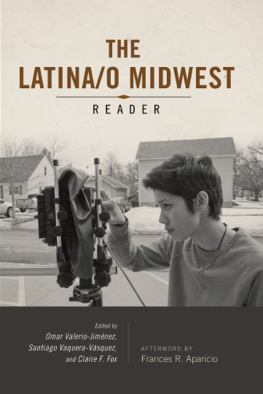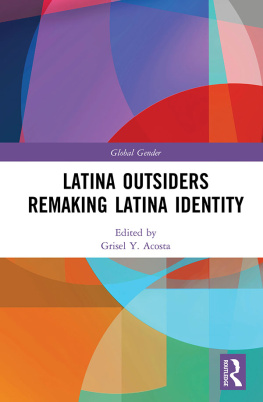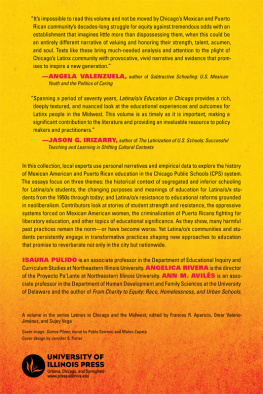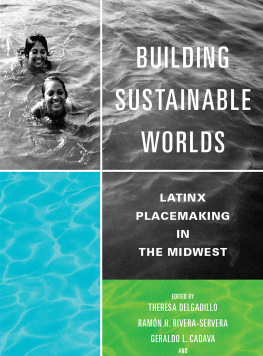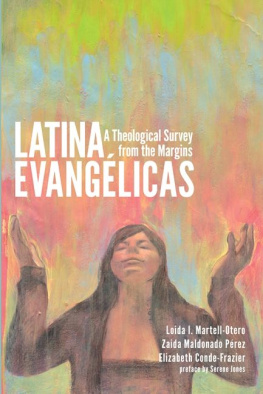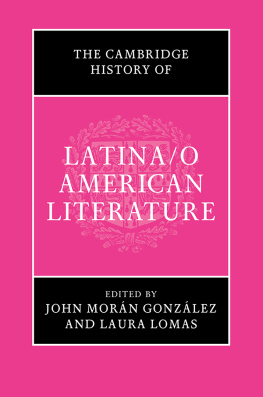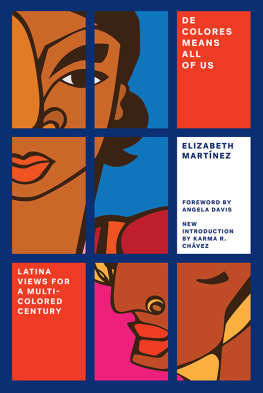Acknowledgments
The editors owe a debt of gratitude to the many wonderful colleagues who helped and encouraged us during the process of editing The Latina/o Midwest Reader. The idea for this anthology began to germinate at the Obermann-International Programs Humanities Symposium on the Latina/o Midwest held in fall 2012 at the University of Iowa. That symposium and the subsequent Latina/o Midwest Summer Seminar in 2013 were supported by various internal and external grants. Our initial funding for each project, however, was from the UI Obermann Center for Advanced Studies. We would like to thank its director, Teresa Mangum, for her encouragement, foresight in promoting Latina/o Studies, and perpetual good cheer. Our work was made much easier and more pleasant by the Obermann Center's staff, including Jennifer New and Neda Barrett. Teresa, Jennifer, and Neda helped us coordinate the logistics of planning and hosting the symposium and summer seminar, and also made the Obermann Center a welcoming work space in which to meet and discuss our projects. We also received valuable help from research assistants Adrienne Zimmer, Matthew McLaughlin, and Jeannette Gabriel.
We would like to express our appreciation for the scholars, students, and community members who participated in the Latina/o Midwest Symposium held at the University of Iowa. After such an exciting symposium that showcased the contributions of Latinas/os to the Midwest, we were thrilled to gather with colleagues who participated in the Teaching the Latina/o Midwest Summer Seminar at the Obermann Center for Advanced Studies the following year. This anthology is a direct product of many productive and energizing discussions at that summer seminar.
The editors would also like to thank the many colleagues, students, and community members who supported the Latina/o Midwest events. Although two of the editors, Omar and Santiago, have moved on to other universities, we have lasting memories of the collegial environment that fostered the Latina/o Midwest events. We are especially indebted to Claire for helping secure permissions for images and photographs, and for coordinating many logistical details related to this publication after our departures from the University of Iowa. In addition to this anthology, another legacy of the symposium and summer seminar was the establishment of a Latina/o studies minor at the University of Iowa.
Our editor, Dawn Durante of the University of Illinois Press, has been very supportive throughout this publication process. We would like to thank Dawn for advocating on behalf of this project and for believing in the need for this anthology. The text and arguments in The Latina/o Midwest Reader were strengthened through the constructive criticisms of the three external readers of the manuscript. We would also like to thank the Latinos in Chicago and the Midwest Series editors, Frances R. Aparicio, Juan Mora-Torres, and Mara de los Angeles Torres.
Finally, the editors would like to acknowledge the book subvention support from the Office of the Vice President for Research and Economic Development, the College of Liberal Arts and Sciences, and the Department of English at the University of Iowa, as well as the College of Liberal and Fine Arts at the University of Texas at San Antonio.
Afterword
Intimate (Trans)Nationals
FRANCES R. APARICIO
Nothing is like Chicago.
Milagros
Intralatinas/os in Chicago
Milagros, a Chicago-born MexiRican, describes her city of birth as an exceptional cultural space where MexiRicans feel a sense of belonging. She juxtaposes the Windy Citywhere you actually have both of us, both of our communities hereto the East and West Coasts, where, during her travels there, you do feel a little bit lonely.
Milagros's reference to feeling lonely in a different coast points to a real, public invisibility and lack of acknowledgment nationwide about Intralatinas/os Famous Latinas/ossuch as federal judge Pedro Castillo and Alderman Carlos Ramrez-Rosa in Chicago, civil rights activist Silvia Mndez in Southern California, broadcast journalist Natalie Morales in New York, actress Zo Saldana in Hollywood, poet Emanuel Xavier in Brooklyn, and novelist Cristina Garca in Los Angelesare all of mixed Latin American nationalities. Yet this national hybridity remains undocumented and unacknowledged publicly. In this chapter I share a select number of anecdotes from interviews with Chicago-based Intralatinas/os to illustrate how they negotiate between their two or more national identities and how they get racialized relationally by both national communities. Given the long history of social interactions between Mexicans and Puerto Ricans in Chicago, it is appropriate to situate our study of Intralatina/o subjects in Chicago as a model for future scholarship on these mixed identities.
Chicago as a Site of Latinidad
Latina/o Chicago demographics challenge the still-strong, national, segmented frameworks that inform our scholarship. The 2010 U.S. Census indicates that Latinas/os constitute 28.9 percent of the Chicago population and 15.8 percent of Illinois. In Chicago, Mexicans are by far the largest group, accounting for 21.4 percent of the total Chicago population, followed by Puerto Ricans at 3.8 percent and Guatemalans at 0.7 percent. Ecuadoreans are the fourth largest group of Latinos in Chicago at 0.6 percent, followed by Cubans and Colombians at 0.3 percent. Dominicans constitute 0.1 percent.of Latinidad, I would claim that this publicly emerging, yet not so new, Latinidad remains silenced and elided by most scholars of Latina/o studies.
Between 2008 and 2012, I interviewed twenty Intralatina/o subjects from Chicago. They are mostly between eighteen and twenty-five in age, all 1.5, second-, and third-generation Latinas/os raised in Chicago. All were college students in the Chicago area, and some had been exposed to Latina/o studies courses, a factor that may have influenced their pride in their mixed identities. There are six MexiRicans; five Mexican Guatemalans; two Mexican Colombians; one Chilean Colombian; one Guatemalan, Nicaraguan, and Puerto Rican; one Dominican, Chicano, and Puerto Rican; one Bolivian Cuban; one Puerto Rican Ecuadoran; one Salvadoran Puerto Rican; and one Mexican Peruvian. As Elena Padilla documented in her 1947 study of Puerto Rican identity formation in New York and Chicago, Yolanda Torres, a dark, curly haired [Puerto Rican] woman moved to Chicago following a Mexican family she had met in New York. In 1935 she married Pedro Vlez, a relative of the Mexican family with whom she lived who worked in the steel mills. This is, perhaps, the first documented MexiRican marriage in Chicago, which Padilla explains ended in divorce by 1938, and thus evinces the beginnings of shared living spaces and both tense and positive social dynamics between both groups.
Chicago and the Midwest have served, historically, as sites of hemispheric encounters among Latin Americans of diverse nationalities. It is not arbitrary that other scholars in this anthologyRamn Rivera-Servera, Theresa Delgadillo, Lilia Fernndez, and Kim Potowskihighlight the pan-Latina/o social interactions or identities that characterize this region. These interviews reaffirm these contradictions and tensions within Latina/o Chicago.
As Mrida Ra has written, the city of Chicago is an ideal site to explore Latinidad via Inter-Latina/o relations because it is a space where Puerto Rican migrants and Mexican (im)migrants have had to strategically negotiate Latina/o identities both in the past and in contemporary times. Ra argues that examining Latinidad in Chicago now is imperative for future studies in other Latina/o urban centers. Given the long history of encounters between Puerto Ricans and Mexicans in Chicago, which, according to Ra, suggests that the Midwest is the site where the East meets the West Coast, these narratives and anecdotes about negotiating nationalities and relational racializations will reveal also the hidden ways in which national identities continue to erect boundaries as well as allow for new hybridities in our local everyday lives with family, friends, classmates and coworkers.

